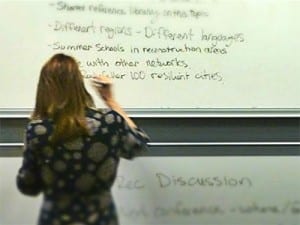Volunteering and networking at the i-Rec 2015 conference
By ucyow3c, on 22 July 2015
![]() Written by Jacopo Spatafora, MSc student at the UCL Institute for Risk and Disaster Reduction
Written by Jacopo Spatafora, MSc student at the UCL Institute for Risk and Disaster Reduction

i-Rec 2015 conference
(Image courtesy of Jacopo Spatafora)
It’s the beginning of July. While writing my thesis, I receive a forwarded e-mail from my friend, Helen: “Might be of interest – i-Rec 2015, held at UCL from 6 to 8 July. Volunteers needed for organising event.”
Wondering if sacrificing three valuable study days for an event was sensible or insane, I signed up…
i-Rec is an international conference, taking place every two years since 2002. It is a meeting point for practitioners and academics specialising in post-disaster recovery and reconstruction.
A multifaceted event
The UCL Bartlett Development Planning Unit, with global expertise in disaster-related practices, joined i-Rec 2015 to help share its research, comparing ideas based on past findings and future trends.
The conference aimed to answer how we can:
• satisfy the real needs of a community
• build a home instead of a house
• make good policies for best practices
• prevent damages from future hazards.
To do this, it also invited and drew upon contributions from a range of people present at the event, including: professors and lecturers; disaster managers; architects and engineers; urban planners; risk analysts; social scientists; communications experts; and NGO representatives.
The rich composition of speakers and audience members opened the door to curiosity and improvement – fundamental ingredients for a developing field like post-disaster recovery.
People, as well as places
As a student who has worked on hundreds of essays throughout the year, I have often daydreamed about the authors I have been studying and their experiences. Meeting them in reality goes well beyond expectations…
Dr Cassidy Johnson was the main organiser of the event, leading the conference with a contagious enthusiasm. Next to her, Fatemeh Arefian gave an energetic presentation and brainstorming talk.
I also had several more personal interactions with guests at the event, including: a thought-provoking discussion with the energetic Graham Saunders; an amusing conversation with Ian Davis and David Alexander; and a sharing of academic insights with David Sanderson and Ilan Kelman.
And these are just a few of the people I met over the course of the day. However, the real stars of i-Rec were the facilitators and event participants who shared their work – their experiences were incredibly fascinating.
The benefits of networking
Following my experience at i-Rec, I would offer one key piece of advice to anyone looking to volunteer at an event – do interact! I decided to make the most of the experience and attempt to build my own network by speaking to as many people as possible.
The speakers and audience members were especially knowledgeable in (and curious about) their fields, constantly listening and relating to each other’s opinions; every coffee break was an occasion to share experiences and feedback, and it was a great opportunity for me to get involved.
And another hint – take plenty of business cards with you. Trust me, they will disappear very quickly!
Managing an international event
According to the organisers, i-Rec 2015 was attended by some 120 people. Therefore, we volunteers had to complete a variety of tasks: cover reception; find adequate spaces and tools for speakers; and check and update the schedule, ready for last-minute changes. And then there were reports to collect, catering to set up, tours across London to organise…
On first impressions, the experience might seem like a very stressful one, but take it from me – it was really fun! Despite my colleagues and I having to complete lots of tasks throughout the day, the results were truly rewarding.
An empowering experience
i-Rec 2015 was an amazing, confidence-building experience, and a nice surprise at the end of my studies. I now have a new perspective on disasters and reconstruction. But more notably, I also have a deeper understanding of the people living those events.
 Close
Close

